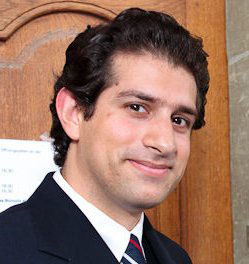PhD Nima Dokoohaki
CONGRATULATIONS ON YOUR GRADUATION
Published Mar 11, 2013
Nima Dokoohaki from Iran came to School of Information- and Communication Technology for master studies in software engineering of distributed systems. He continued with PhD studies and now he has defended his PhD thesis Trust-based user profiling.

Where are you from and where did you study before coming to KTH?
– I am from Iran and I studied in Shiraz, Iran for my bachelors degree. I got my masters degree here at KTH, School of Information- and Communication Technology in the masters programme, Software Engineering of Distributed Systems.
Which is your topic and why did you choose it?
– My thesis is entitled Trust-based user profiling. My topic analyzes the correlation between two very important web technologies: trust computing and web profiling. You have profiles everywhere for example Facebook, Twitter and Google. Your on-line profile is used ultimately by system to customize and personalize the services you receive on-line. Your profile tells everything about you and your preferences, while it also helps on-line businesses to gather information and customize their understanding about you, your preferences and importantly your information goals and needs.
While the qualities of these personalization services may vary, automated nature of these technologies might lead to building an incorrect image of you. My argument is that trust can help in gathering a better understanding of user and it's preferences by choosing the sources (people or content) they "trust" more and thus improving overall performance of the system; like getting more trustworthy recommendations or filtering less relevant results.
I learned about the importance of trust on the web back in 2007 when Semantic Web, originally coined by Tim Berners Lee father of WWW, was a very important and crucial field of research. At those times social networks and social networking were not as popular as are right now. I focused on modeling semantics of social trust and in my master thesis I wrote about shortcomings of existing trust languages to present your belief in other people's opinion and behavior on the web. Later on when EU FP7 Smartmuseum project was proposed, which was a pilot for developing distributed navigation systems in Museums, I was encouraged by Prof. Mihhail Matskin to enhance my original proposal with user profiling technique used in the Smartmuseum platform. The rest of my research builds on this original proposal specially developing how to express trust for personalization services, adding privacy measures on top of existing services and nowadays measuring trustworthy opinions in mainstream social media such as Twitter.
Describe your topic in short
– When you are working with internet services you get personalized results, which are generated based on your profile. An example of these personalized results are for instance recommendation list of people to connect to in Twitter or list of hotel reviews retrieved for you when searching on TripAdvisor. What's important to my work is the quality of reviews that you read about for instance Scandic hotel on TripAdvisor, or the relevance of suggestion of the people that is shown to you on Twitter. Now, the problem is when Twitter suggests someone which you have no idea how he/she is related to you and on what basis, or the review that you are reading on Tripadvisor is negative, probably not helpful and it's shown to you at the top of the list.
Trust research has shown that for instance content similarity (birds of a feather often flock together) as well as social relations (friends of friends) can help in increasing the quality of personalization by getting more accurate recommendations or filtering irrelevant reviews. But for this to happen certain models, metrics and tools are needed to enhance existing default profiling techniques, which is where I fit my proposal. For instance, we have shown in an award winning paper how textual content of the reviews, combined with star ratings given by users to products can be analyzed and together can summarize a long list of reviews about a hotel and give you only trustworthy relevant summaries of what you are looking for for instance, just positive reviews about price of this hotel.
Tell us something about your results
– My work is a collection of experimental research and most of my proposals involve introduction of a method followed by experiments on data gathered from the web. I have contributions to profiling data structures (ontologies of users in digital libraries and social web modeling) and their adoption in recommender systems and social networks. As pointed out I have contribution to methodologies and tools for e-commerce web content mining and diversification. Throughout out my work we have tested our proposals with real data taken from many important websites like: Movielens, LiveJournal, Epinions, Yahoo and Twitter.
What will the future bring for your research topic?
– Well, social trust will remain a hot topic as long as people and their data are under focus. Both recent trends of Cloud Computing as well as Internet of Things will keep trust in their agenda, especially when people and organizations increase their usage of public clouds for storing their sensitive data. With regards to profiling, new types of content as well as new types of processing techniques will keep profiles in focus. With increasing size of data as well as data streaming techniques, new user profiling techniques are needed to model people, their relations and their preferences on the fly. At the same time, with increasing availability of recommendation engines or adaptation solutions, new methods of profiling are also needed to answer people's information needs and tasks.
What are your future plans?
– For the time being I will stay here in Sweden and continue my research and teaching.

